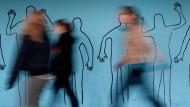“Don’t yell at me up here.” The admonition by Parliament President Astrid Wallmann (CDU) to the AfD parliamentary group was symptomatic of a heated plenary debate in the state parliament. It began on Wednesday morning with a motion for a resolution by the government factions. “Hesse is coming through the crisis in a stable manner” was the headline of the text with which the government factions praised the state government they had set up and the federal government for the fact that the crisis had not been as dramatic as feared. Because in Wiesbaden and Berlin, the SPD and FDP are also in government alongside the Union and the Eco-Party, the four factions, apart from minor taunts, were unusually united in the debate.
For once, the role of the opposition fell solely to the representatives of the political fringes. The motion for a resolution belongs on “the compost heap of history,” said MP Andreas Lichert from the right wing of the AfD. The fact that Germany will in all probability get through the winter without serious restrictions in the gas supply is not due to politics, but to the weather. Lichtert complained about the high costs of the Ukraine conflict. The price increases put a strain on purchasing power and caused a “massive loss of prosperity for all citizens” due to the permanently higher price level.
“Embarrassing transatlantic pandering”
MP Michael Müller (CDU) replied that it was significant that he was not concerned with the horror of war, but rather with maintaining his own prosperity. Lichtert attracted even more criticism with the thesis that there was “no alliance obligation” on the part of Germany with regard to Ukraine. The AfD deputy criticized the arms deliveries and criticized Europe’s “unilateral partisanship” and “embarrassing transatlantic pandering”. The West is waging an economic war against Russia, Lichtert said. However, the sanctions hurt him more than Russia.
Wallmann had to ask for silence in the plenary several times when Lichtert addressed the MPs in the middle of the plenary directly: “They are not looking for peace, for diplomatic solutions. That is disgraceful.” Foreign Minister Annalena Baerbock (Die Grünen) accused Lichert of “verbal warmongering”.
René Rock, the parliamentary leader of the FDP, accused Lichert that Russia was waging a brutal war of aggression. The soldiers raged in Ukraine, the streets were paved with corpses, women were raped, hospitals were bombed, children were kidnapped. Then Rock turned directly to the AfD: “Are you not interested in all that?”
queue at the tables
In response, Lichert accused Rock of “breathtaking infamy.” He avoided even the slightest hint of distancing himself from the Russian side. Instead, he spoke of “American gunboat policy”. The AfD is not an “alternative” but “a disgrace for Germany,” said Günter Rudolph, leader of the SPD parliamentary group. Economy Minister Tarek Al-Wazir called the debate very exciting. “The mask of the AfD is off.”
Jan Schalauske, the chairman of the left, described social emergencies. Two million people were queuing at the panels. Inflation leads to massive real wage losses. Every fourth child, every third young woman, every second single parent is affected by poverty. Social inequality is increasing. Hessen does not come through the crisis stably, as the coalition claims.
“Hesse remains stable with the ongoing redistribution from bottom to top.” The rising prices are caused by the war, according to Schalauske. In view of the suffering of the people and the risk of the war spreading to all of Europe, everything must be done to end it through diplomatic channels.










